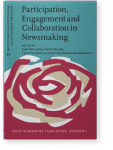Chapter 3
“It is, perhaps more than ever before, a matter of participation”
Ontological tension and boundary work in a free trade blog
This chapter presents a discourse-analytical approach to
a series of blogposts uploaded to the website of Brussels-based libertarian
think tank between 2015 and 2018 in reaction to the controversy over the
Transatlantic Trade and Investment Partnership (TTIP). In these blogposts,
economic experts and professionals reflect about how to successfully
persuade the public of the case for free trade. We argue that these
blogposts rest on two ultimately incompatible ontologies – one founded in
economic science, the other based on a rudimentarily constructionist
understanding of media and the public debate. The tension generated by the
clash of these ontologies turns the blogposts into an interesting example of
the negotiation of professional identities at a time when participation,
collaboration and engagement are increasingly getting sedimented as the
baseline for newsmaking practices.
Article outline
- Introduction
- Research design
- The politics of free trade, the European centre for international
political economy and their blog
- Evidence of conflicting ontologies in a free trade blog
- Communication, campaigning, and language
- Post-truth
- Post-truth strategies
- Legacy to new media
- Implications for the public debate on free trade
- Conclusion
-
Notes
-
References
